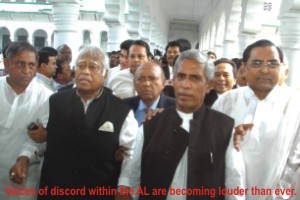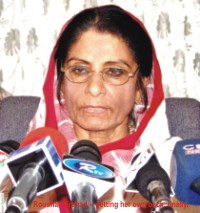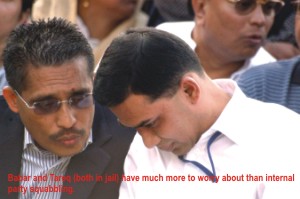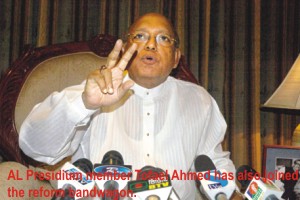| Cover Story
The Heat is On
Aasha Mehreen Amin
 Two camps have emerged within BNP now. The pro-reform camp, led by the party's Secretary General Mannan Bhuiyan, is eager to get the reform proposals approved through a party council as soon as possible. The other camp, loyal to BNP Chairperson Khaleda Zia wants to take their sweet time before any such proposals are discussed perhaps to buy some time during which they can gage the situation and try to garner more support from as many party workers as possible. The differences have become so great between the two camps that there is every possibility that the party itself may split up. Two camps have emerged within BNP now. The pro-reform camp, led by the party's Secretary General Mannan Bhuiyan, is eager to get the reform proposals approved through a party council as soon as possible. The other camp, loyal to BNP Chairperson Khaleda Zia wants to take their sweet time before any such proposals are discussed perhaps to buy some time during which they can gage the situation and try to garner more support from as many party workers as possible. The differences have become so great between the two camps that there is every possibility that the party itself may split up.
The reformists are adamant about not allowing Khaleda to keep her chairmanship while Khaleda is not willing to let go of it so easily.
 In this intra-party competition Mannan Bhuiyan for now seems to be the stronger player. He has the support of many of the district and grassroots leaders while Khaleda has to deal with the fact that her son is in custody with corruption charges, which eventually could catch up on her as well. Khaleda has reportedly called up many leaders telling them to be patient and assuring them that the glory days of the BNP will come back. In this intra-party competition Mannan Bhuiyan for now seems to be the stronger player. He has the support of many of the district and grassroots leaders while Khaleda has to deal with the fact that her son is in custody with corruption charges, which eventually could catch up on her as well. Khaleda has reportedly called up many leaders telling them to be patient and assuring them that the glory days of the BNP will come back.
Khaleda seems desperate. She has told reporters that for a national council to take place the ban on indoor politics has to be lifted, moreover, the council would have to take place over a few days to make sure that all voices of the party are heard. This sudden change of stance from being absolutely dictatorial as far as party matters are concerned to being a fair, democratic leader interested in hearing the voices of lesser mortals, fails to hold much credulity. The BNP has not had a single council for the last 14 years according to the pro-reform leaders. According to the party constitution, a council is supposed to be held every three years. Even at regular party meetings only the chairperson's favourites have been allowed to speak giving no opportunity to ordinary party members to have their say in anything.
 Knowing that Khaleda still enjoys the support of some of the party offshoots such as the Chattra Dal and a part of the women's faction, the reformists are losing no time in luring as many groups and grassroot leaders over to their camp. Already leaders of the Jubo Dal, Krishak Dal and Jatiyatabadi Samajik Sangskritik Sanghatan (JSS) have met with Bhuiyan and have shown their interest in supporting the reform proposals. In fact the reformists seem to have a hold over most of the districts politically important for the BNP. This includes Mannan's own constituency Narshindi and a few zillas around Dhaka. Knowing that Khaleda still enjoys the support of some of the party offshoots such as the Chattra Dal and a part of the women's faction, the reformists are losing no time in luring as many groups and grassroot leaders over to their camp. Already leaders of the Jubo Dal, Krishak Dal and Jatiyatabadi Samajik Sangskritik Sanghatan (JSS) have met with Bhuiyan and have shown their interest in supporting the reform proposals. In fact the reformists seem to have a hold over most of the districts politically important for the BNP. This includes Mannan's own constituency Narshindi and a few zillas around Dhaka.
Khaleda may therefore find herself lonelier than ever in her fight to keep her position as head of the party she has controlled single-handedly for so long. Grassroot leaders are becoming weary of the cases of corruption against many of her inner circle and no longer want to be associated with a leader who has sheltered corrupt, criminals that have given the party such a disgraceful image. While Khaleda continues to stay in la la land, making ludicrous claims that her party has always been democratic and never dynastic, it seems that Bhuiyan and gang are getting busy luring in more supporters to back their reform agenda that would mean a final adieu to Khaleda's leadership.
 The AL's boat meanwhile is in choppy waters. As a party the AL, has not jumped the reform bandwagon as eagerly as BNP, which has more to lose in the immediate future and is far more in the public eye because of the relentless corruption drive of the government. But there is major discord within the AL. Many of the party leaders have started speaking out against what they believe were imprudent and unilateral decisions made by their president, Sheikh Hasina. During a modest commemoration of the AL's founding anniversary held last month party leaders openly criticised her autocratic leadership for 26 years and taking decisions that contradicted the party's ideology. This included the April 30th deadline announced by Abdul Jalil to unseat the BNP-led coalition government, signing of the MOU with Khelafat Majlish and making unnecessarily provocative statements against the caretaker government when she was abroad that they believe The AL's boat meanwhile is in choppy waters. As a party the AL, has not jumped the reform bandwagon as eagerly as BNP, which has more to lose in the immediate future and is far more in the public eye because of the relentless corruption drive of the government. But there is major discord within the AL. Many of the party leaders have started speaking out against what they believe were imprudent and unilateral decisions made by their president, Sheikh Hasina. During a modest commemoration of the AL's founding anniversary held last month party leaders openly criticised her autocratic leadership for 26 years and taking decisions that contradicted the party's ideology. This included the April 30th deadline announced by Abdul Jalil to unseat the BNP-led coalition government, signing of the MOU with Khelafat Majlish and making unnecessarily provocative statements against the caretaker government when she was abroad that they believe  prompted the government to take a hard line against the AL leaders. Eager to placate her critics, Hasina said she would leave her post if the party council did not want her but requested that they remain united so as not to misguide party workers. She also gave the lamest excuses for her decisions. She couldn't really understand the situation from so far away in Singapore when the April 30th deadline was announced she explained. The deal with Khelafat was off she insisted and even tried justifying her unsavoury decision by saying that it was Khelafat which had come to the AL promising a secular policy. But if our memory serves us right the infamous MOU agreed to conditions far from secular such as allowing fatwas to be declared and making sure that no anti-Sharia laws would be promulgated. prompted the government to take a hard line against the AL leaders. Eager to placate her critics, Hasina said she would leave her post if the party council did not want her but requested that they remain united so as not to misguide party workers. She also gave the lamest excuses for her decisions. She couldn't really understand the situation from so far away in Singapore when the April 30th deadline was announced she explained. The deal with Khelafat was off she insisted and even tried justifying her unsavoury decision by saying that it was Khelafat which had come to the AL promising a secular policy. But if our memory serves us right the infamous MOU agreed to conditions far from secular such as allowing fatwas to be declared and making sure that no anti-Sharia laws would be promulgated.
 Like her arch-rival Khaleda, Hasina and her loyalists are trying to buy time by saying that it is not possible to have reforms unless a proper council is organised and a council cannot take place when the country is under emergency and when indoor politics is still banned. Like an errant band member who wants to go solo, Abdur Razzak, in a surprise move, publicly declared a set of reforms that came under fire from AL stalwarts like Motia Chowdhury and Zillur Rahman. His reform proposal includes barring the party president and general secretary from holding the posts for more than two terms in a row, which, if implemented, would divest Hasina of her post as president of the party. Razzak also announced quite a few sweeping reforms in the political landscape. These include: recognition of the Father of the nation, execution of verdict of Bangabandhu's murder trial, ensuring state level honour for the four slain national leaders brutally killed in jail, bringing their killers to book, preservation of correct history of the liberation struggle and liberation war and abolition of Like her arch-rival Khaleda, Hasina and her loyalists are trying to buy time by saying that it is not possible to have reforms unless a proper council is organised and a council cannot take place when the country is under emergency and when indoor politics is still banned. Like an errant band member who wants to go solo, Abdur Razzak, in a surprise move, publicly declared a set of reforms that came under fire from AL stalwarts like Motia Chowdhury and Zillur Rahman. His reform proposal includes barring the party president and general secretary from holding the posts for more than two terms in a row, which, if implemented, would divest Hasina of her post as president of the party. Razzak also announced quite a few sweeping reforms in the political landscape. These include: recognition of the Father of the nation, execution of verdict of Bangabandhu's murder trial, ensuring state level honour for the four slain national leaders brutally killed in jail, bringing their killers to book, preservation of correct history of the liberation struggle and liberation war and abolition of  communal politics. The proposals also apparently aim to make the party more accountable and honest: all party funds should be deposited in a bank under a party treasurer's supervision who will submit treasury reports to quarterly party meetings; all committees of the party will be elected through secret ballots; anti-liberation or war criminals will not be eligible for membership; anyone convicted of crime or owners of black money will not be eligible for electoral nominations. Following Razzak's footsteps, Tofael Ahmed, a Presidium member, announced his own set of reform proposals that pretty much echoed those of Razzak's. In his characteristic style, the vociferous leader made emotional statements saying he would rather kill himself than allow the AL to split up because he was so loyal to Bangabandhu. At the time of writing this article, Surunjit Sengupta was to announce his reform proposals, no doubt similar to that of his fellow reformists. communal politics. The proposals also apparently aim to make the party more accountable and honest: all party funds should be deposited in a bank under a party treasurer's supervision who will submit treasury reports to quarterly party meetings; all committees of the party will be elected through secret ballots; anti-liberation or war criminals will not be eligible for membership; anyone convicted of crime or owners of black money will not be eligible for electoral nominations. Following Razzak's footsteps, Tofael Ahmed, a Presidium member, announced his own set of reform proposals that pretty much echoed those of Razzak's. In his characteristic style, the vociferous leader made emotional statements saying he would rather kill himself than allow the AL to split up because he was so loyal to Bangabandhu. At the time of writing this article, Surunjit Sengupta was to announce his reform proposals, no doubt similar to that of his fellow reformists.
 Razzak's (and Tofael's, Suranjit's and who knows who else's) reform agenda certainly sounds like a wonderful antidote to the undemocratic practices that have crept into AL's political strategies, if only they represented the collective voice of the party. Unfortunately Razzak did not get the go-ahead from other party leaders, least of all Hasina, something that will surely lead to feuding and resentment. Motia Chowdhury compared Razzak's proposal to guerrilla tactics although she did say she was willing to consider them seriously only if they were placed before the party's working committee. Razzak's (and Tofael's, Suranjit's and who knows who else's) reform agenda certainly sounds like a wonderful antidote to the undemocratic practices that have crept into AL's political strategies, if only they represented the collective voice of the party. Unfortunately Razzak did not get the go-ahead from other party leaders, least of all Hasina, something that will surely lead to feuding and resentment. Motia Chowdhury compared Razzak's proposal to guerrilla tactics although she did say she was willing to consider them seriously only if they were placed before the party's working committee.
 Ershad, a smaller player in the reform game although definitely the most colourful, had to live up to his drama-king persona announcing on July 1 that he was quitting his post as chairman of Jatiya Party (JP). He appointed Anisul Islam Mahmud to take his place for the time being until the council elects a new chief. This completely thwarts his wife Roushan Ershad's feeble attempt to hog the chairmanship herself that she had announced a few days earlier at a press conference. The doddering Roushan, however showed more grit than one would imagine her to have by not budging from her position. Ershad, a smaller player in the reform game although definitely the most colourful, had to live up to his drama-king persona announcing on July 1 that he was quitting his post as chairman of Jatiya Party (JP). He appointed Anisul Islam Mahmud to take his place for the time being until the council elects a new chief. This completely thwarts his wife Roushan Ershad's feeble attempt to hog the chairmanship herself that she had announced a few days earlier at a press conference. The doddering Roushan, however showed more grit than one would imagine her to have by not budging from her position.
 She continued to try and win over more JP leaders perhaps sick and tired of their aging chairman's autocratic party rule. Ershad, meanwhile is still under the delusion that he will come back, perhaps banking on people's amnesia regarding his nine years of military dictatorship, his constant philandering, his colourful marriages and affairs, not to mention his last act of accusing his second wife of stealing his mobile and putting her in jail. She continued to try and win over more JP leaders perhaps sick and tired of their aging chairman's autocratic party rule. Ershad, meanwhile is still under the delusion that he will come back, perhaps banking on people's amnesia regarding his nine years of military dictatorship, his constant philandering, his colourful marriages and affairs, not to mention his last act of accusing his second wife of stealing his mobile and putting her in jail.
Ershad claims that he decided to step down as chairman, a post he has grabbed since 1986, to pave the way for reforms in JP. But it is evident that it is the pressure from outside and inside the party that forced the former military dictator to call it a day.
 So whatever happened to the youngest player in the game of Bangladeshi politics - the eight-month old Liberal Democratic Party? Led by former BNP leader Colonel (rtd) Oli Ahmed it portrayed itself as a clean and honest party that attracted disgruntled BNP leaders and of course the smooth talking doctor-turned-politician Professor AQM Badrudozza Chowdhury. The rift between the colonel and the doctor came to the forefront when the former announced that the latter, along with Major (rtd) M A Mannan had left the party. Professor Badrudozza however, categorically stated that he and his friends were now the real LDP as most of the national executive members of the party had joined him. While Oli accused the Bikalpa Dhara founder of being undemocratic and disinclined to support joint leadership, the professor said that Oli wanted to divide the country into 11 provinces which would be against the constitution of the country. So whatever happened to the youngest player in the game of Bangladeshi politics - the eight-month old Liberal Democratic Party? Led by former BNP leader Colonel (rtd) Oli Ahmed it portrayed itself as a clean and honest party that attracted disgruntled BNP leaders and of course the smooth talking doctor-turned-politician Professor AQM Badrudozza Chowdhury. The rift between the colonel and the doctor came to the forefront when the former announced that the latter, along with Major (rtd) M A Mannan had left the party. Professor Badrudozza however, categorically stated that he and his friends were now the real LDP as most of the national executive members of the party had joined him. While Oli accused the Bikalpa Dhara founder of being undemocratic and disinclined to support joint leadership, the professor said that Oli wanted to divide the country into 11 provinces which would be against the constitution of the country.
 The caretaker government so far is not particularly moved by the flurry of reform that the parties are trying to sell. There does not seem any let up in the cleansing drive that may ultimately leave a meagre number of possible candidates in the electoral race. The Election Commission has intimated that it is willing to discuss the reforms within the commission with the political parties despite the ban on indoor politics although this seems little consolation for the parties, which are on the verge of being split apart by internal bickering. The attempts to revamp the parties may give hope to some of the younger leaders that they will have a more significant role in decision-making. This maybe the only happy outcome of these intra-party rumblings. The reality is that corruption has been the glue that has kept a party united with a 'you scratch my back and I scratch yours' philosophy kept alive by unscrupulous opportunists. Corruption, moreover, has always trickled down from the highest level to the lowest. It has reached every nook and cranny of political parties including the grassroots level. If these parties really think they can convince the people of their sincerity in becoming more democratic within the parties, a major cleansing of criminal elements within the party is necessary. While the proposed reforms that promise to make parties more democratic sound pretty good on paper, it will be hard to convince the public that years of nepotism, dictatorship and overwhelming greed that have been so entrenched in our political arena, will all of a sudden disappear just because reform is seen as synonymous to survival. The caretaker government so far is not particularly moved by the flurry of reform that the parties are trying to sell. There does not seem any let up in the cleansing drive that may ultimately leave a meagre number of possible candidates in the electoral race. The Election Commission has intimated that it is willing to discuss the reforms within the commission with the political parties despite the ban on indoor politics although this seems little consolation for the parties, which are on the verge of being split apart by internal bickering. The attempts to revamp the parties may give hope to some of the younger leaders that they will have a more significant role in decision-making. This maybe the only happy outcome of these intra-party rumblings. The reality is that corruption has been the glue that has kept a party united with a 'you scratch my back and I scratch yours' philosophy kept alive by unscrupulous opportunists. Corruption, moreover, has always trickled down from the highest level to the lowest. It has reached every nook and cranny of political parties including the grassroots level. If these parties really think they can convince the people of their sincerity in becoming more democratic within the parties, a major cleansing of criminal elements within the party is necessary. While the proposed reforms that promise to make parties more democratic sound pretty good on paper, it will be hard to convince the public that years of nepotism, dictatorship and overwhelming greed that have been so entrenched in our political arena, will all of a sudden disappear just because reform is seen as synonymous to survival.
Copyright
(R) thedailystar.net 2007 |
